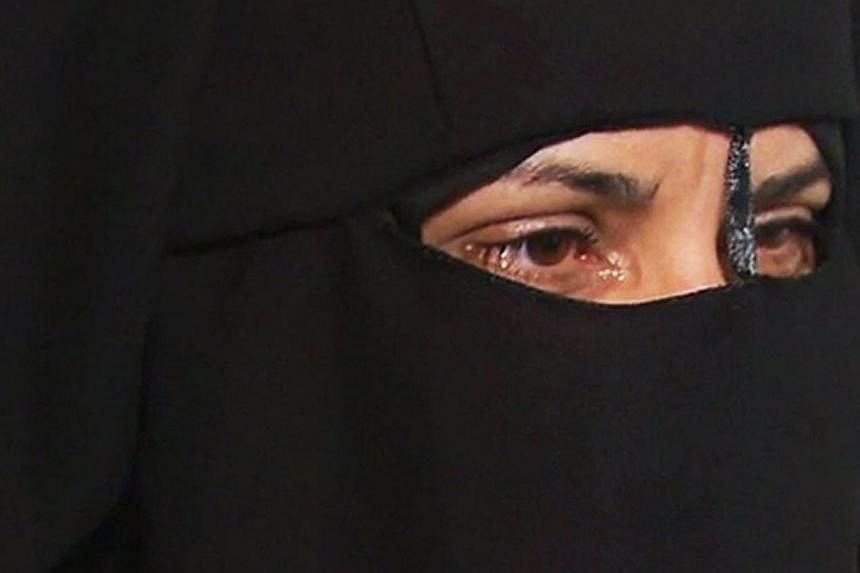The story was reported by CNN. It took place in the portion of Syria now controlled by the Islamic State or Daish.
There, 26-year-old Hanan (not her real name) lived with her father and mother. Her brother had been killed in previous clashes. Her father, distraught at the loss of his son, kept his AK-47 in the house.
When the IS forces entered the city, they went from house to house and, finding a weapon in this one, detained Hanan's father. Mother and daughter remained at home, frantic and frightened of what would happen to the last male left in the family. Time passed and, despite their fervent prayers, he did not return.
Finally, they decided to go to the headquarters of the group. This in itself was a difficult decision; the new rules enforced by the IS police was that no women could venture out of their homes without a male guardian.
On the way, they were stopped several times by IS police squads. They were fully covered, wearing full burkas and niqabs, but this was not enough. Each time they were stopped, they were asked why they were not accompanied by their male guardian, and each time they told the policemen that there was only one and he was in detention at their headquarters.
When they finally reached the headquarters, the two pleaded to have the father and husband released. It was Hanan's mother that went inside to speak to them.
When she returned, she presented Hanan with a terrible choice. The only way that the men would let Hanan's father go was if she agreed to marry their police chief, a man who went by the adopted name of Abu Mohammed Al Iraqi.
Distraught but without options and guided by her desire to have her father released, Hanan agreed. She was married and her father returned home. Her ordeal was, of course, not over.
Marriage to a fighter of the Islamic State in Iraq and Syria (ISIS) proved to be just as desolate and cruel as the policies of their governance. The man she had married lived in a constant state of war, sleeping with a gun next to his pillow, his finger on the trigger, ready to shoot. He barely spoke to her but had no qualms against forcing himself on her regularly.
In the interview she gave to CNN, Hanan said: "I did not feel that he had any emotions. I felt like he just wanted to take what was his right, like he had to."
Then Abu Mohammed Al Iraqi died in battle and Hanan became a widow. The ISIS commander sent a contingent of women to persuade her to marry another fighter. Many of these women were not Syrian but foreigners, some Tunisian and some, she suspected, even European.
It was at this time that Hanan ran away. With the assistance of relatives and after several perilous days, the family was able to cross the border into Turkey. She had left her ordeal behind, but she admits to living in fear to this day.
At a time when much is being said about IS and its construction of the perfect Islamic State, Hanan's story presents the hypocrisy of the group's promises. In a recently published manifesto, the female militants of IS rail and rant against Western customs of forcing women to work and earn money. Hanan's story represents the injustices of their own structures.
Just like the exploitative patriarchies of tribe and caste dominant in so many Muslim societies, women's choices and their bodies are put into the service of a war machine, where their only role is to serve their husbands and breed their children.
As in Hanan's case, marital unions are based not on the Islamically prescribed freedom of choice and mutual respect but rather by exploiting the tenuous and difficult circumstances women like her find themselves in. No thought of purity of character or commitment to justice seemed to have occurred to the men who forced her to be a hostage wife in order to secure her father's freedom.
As the conflict in Syria and Iraq continues to escalate, daily reports are emerging of women from all over the world, including Western Europe, streaming into the region to marry IS fighters. In the rhetoric of radical propaganda that whets such reports, these women willingly marry IS fighters and are responsible only for keeping the men well fed and producing the next generation of warriors.
The reality, as Hanan's story illustrates, is rather different.
Women like Hanan are exploited, their circumstances used as a means of subjugating them and leaving them trapped in loveless lives where they live in despair. One of IS' favourite claims is to have created a perfect Islamic society, devoid of the evils that plague the rest of the imperfect Muslim world.
The reality lies in the stories; Hanan's is one but surely there are thousands of others untold, of women still imprisoned by this latest recipe of oppression.
DAWN/ASIA NEWS NETWORK

